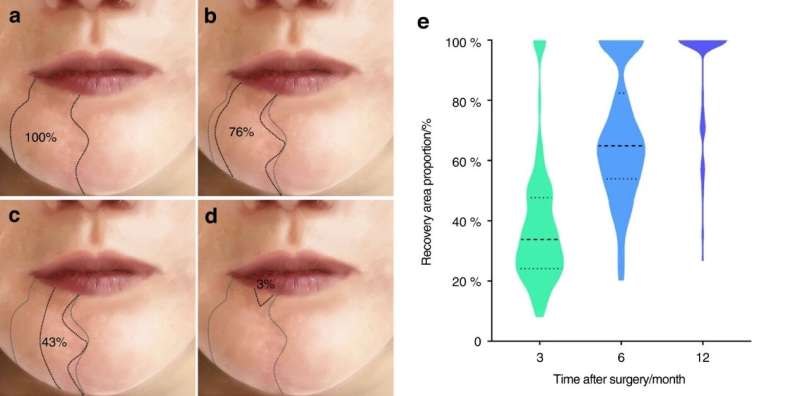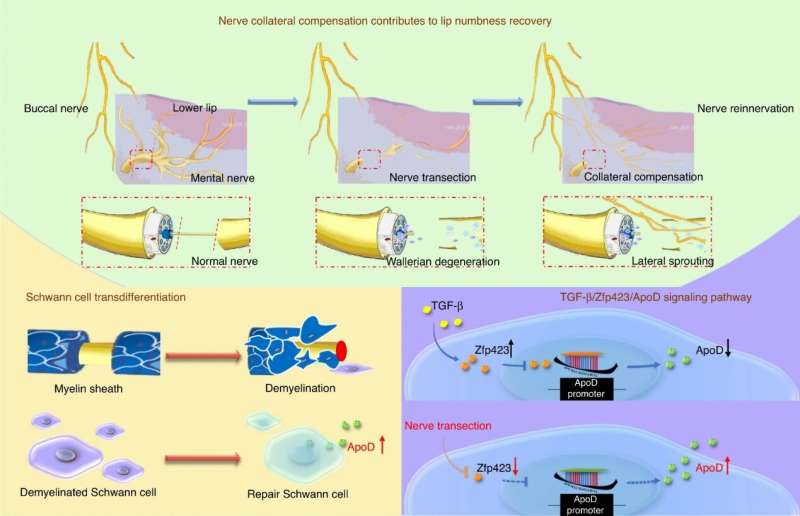This article has been reviewed according to Science X's editorial process and policies. Editors have highlighted the following attributes while ensuring the content's credibility:
fact-checked
proofread
New study offers hope for sensory recovery in patients with lower lip numbness

The loss of sensory function in the lower lip, caused by the sacrifice or damage of the inferior alveolar nerve (IAN) during mandibulectomy, may no longer be an irreversible condition, according to a study published June 8, 2023 in the International Journal of Oral Science. The research, conducted by a team of experts in the field, sheds light on the potential for sensory recovery in patients undergoing IAN sacrifice, offering hope for improved quality of life.
The study revealed that 75% of individuals who underwent unilateral IAN sacrifice experienced nearly complete pain sensation sensory recovery of the lower lip within 12 months after surgery. This finding suggests that the human body has the potential for self-repair and compensation in cases of nerve injury. Factors influencing the rate of sensory recovery were also identified.
Younger patients showed a faster recovery time, while the preservation of ipsilateral buccal and lingual nerves was associated with more favorable outcomes. Additionally, patients with malignant tumors tended to exhibit faster sensory recovery compared to those with benign tumors. To explore the underlying mechanisms of sensory recovery, animal models were used.
The researchers utilized a mental nerve transection model in Thy1-YFP mice and employed tissue clearing techniques to observe the changes in peripheral nerves. The experiments revealed the collateral compensation of the ipsilateral buccal nerve, which played a crucial role in the sensory innervation of the lower lip.
Further investigation into the molecular mechanisms involved in sensory recovery identified Apolipoprotein D (ApoD) as a key player. The expression of ApoD was significantly up-regulated in the lower lip after nerve transection and was found to promote axonal elongation and neurite formation. Moreover, the study highlighted the involvement of the TGF-β signaling pathway, with TGF-β regulating the expression and secretion of ApoD in Schwann cells. Zfp423, a zinc finger transcription factor, was identified as a regulator of ApoD expression through the TGF-β signaling pathway. Silencing Zfp423 resulted in increased ApoD expression and enhanced sensory recovery.
These findings provide valuable insights into the complex processes underlying sensory recovery after peripheral nerve injury. Currently, autologous nerve grafting is the gold standard for reconstructing segmental peripheral nerve defects. However, this approach has limitations, including donor site morbidity and limited nerve supply, resulting in unsatisfactory recovery outcomes. The findings of this study open new possibilities for improving reconstructive surgery techniques to enhance patient outcomes and provide alternative treatment options.

The implications of this study are significant for patients undergoing oral and maxillofacial surgery, as well as for the broader field of nerve injury regeneration and offers hope for patients who have experienced sensory loss in the lower lip due to IAN sacrifice or damage during mandibulectomy. The findings have the potential to revolutionize the field of reconstructive surgery and significantly improve the quality of life for these patients. As further research is conducted, it is anticipated that new treatments and interventions will emerge, ultimately leading to better outcomes and increased sensory recovery rates.
More information: Pingchuan Ma et al, Promotion effect of TGF-β-Zfp423-ApoD pathway on lip sensory recovery after nerve sacrifice caused by nerve collateral compensation, International Journal of Oral Science (2023). DOI: 10.1038/s41368-023-00230-7



















